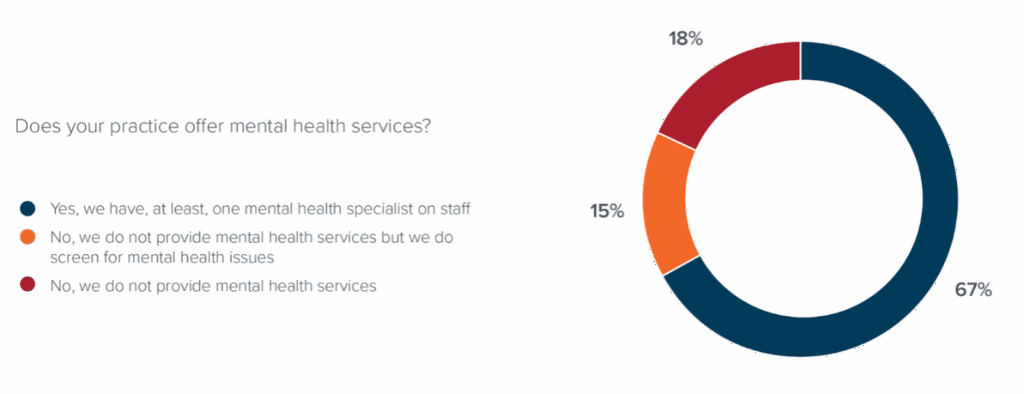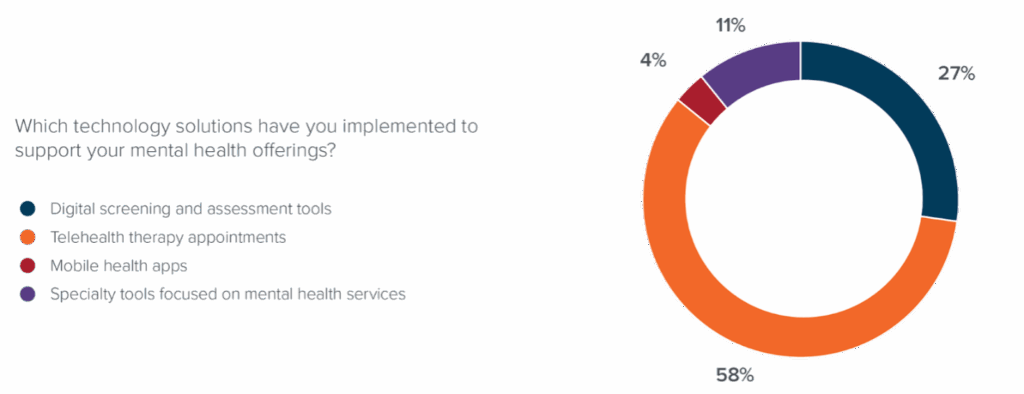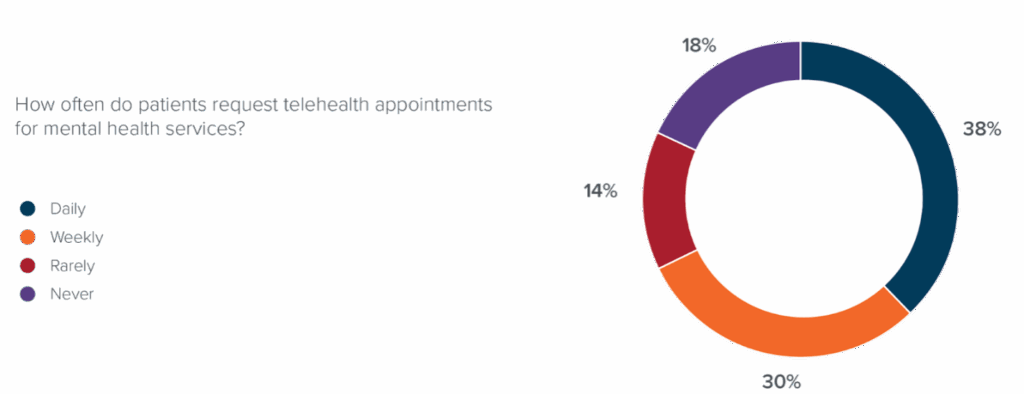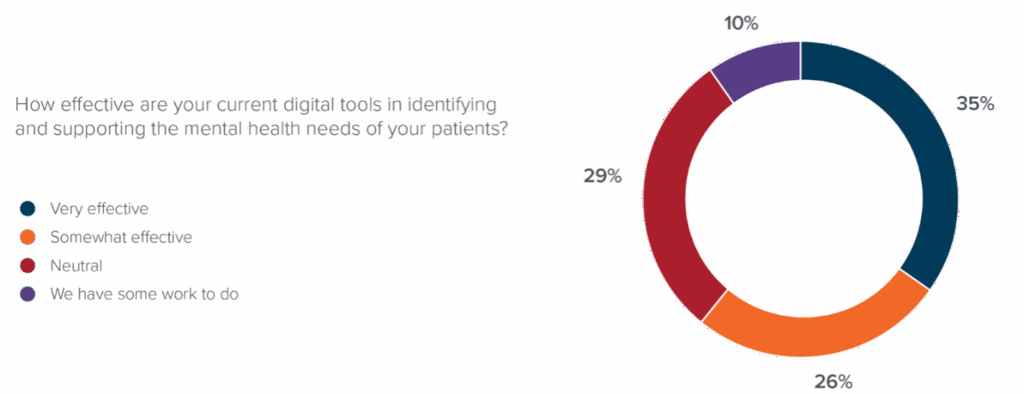AI solutions that help you analyze and understand complex health data.
Prioritizing Mental Health: 67% of Medical Groups Have a Behavioral Health Specialist on Staff

Aaron Glauser
September 24, 2025

According to our survey findings, 38% of respondents say that their practice receives telehealth requests for mental health appointments on a daily basis.
We recently shared the results of a survey we conducted to find out which technology solutions have the biggest impact on patient outcomes. One of the key findings from that survey revealed an important insight: When asked which areas of care have benefited the most from their healthcare technology stack, more than half of the survey respondents cited mental healthcare services.
As a follow-up to our initial survey findings, we are taking a deeper dive into the intersection of healthcare technology and its impact on behavioral health services. Here are five key insights we learned when we asked healthcare providers if their practice offers mental health services and the technology they use to support the behavioral health needs of their patients:
1. More than 65% of respondents report that their practice employs at least one mental health specialist.
According to our survey findings, 67% of respondents said that their practice has at least one mental health specialist on staff. This finding signals a major shift in the ambulatory care industry, with private practices expanding their service offerings to include behavioral health services. Fifteen percent of respondents said that, while they do not provide mental health services, they do screen for mental health issues.
The shift to provide a more integrated care model is a much-needed transformation. Recently, a national study of more than one million children and teenagers diagnosed with major depressive disorder revealed that primary care physicians—not mental health specialists—were the first to diagnose nearly half of the cases.
Creating a more holistic healthcare experience not only helps independently-owned practices improve patient satisfaction and clinical outcomes, but also helps them compete against larger healthcare networks.

2. Nearly 6 in 10 respondents have implemented telehealth solutions to support mental health services.
When asked which technology solutions have been implemented to support mental health services, 58% of respondents reported using telehealth platforms—more than double the number of respondents who said their practice uses digital screening and assessment tools.
While telehealth appointments for other types of care have gradually decreased during the last five years, behavioral health is one area where virtual visits remain strong. Telehealth offers added levels of convenience and flexibility for patients, while also providing access to behavioral health specialists in rural areas that lack access to healthcare providers.
The fact that more than a quarter of respondents have embraced digital screening and assessment tools makes evident that practices are building more comprehensive healthcare technology stacks to support the full mental healthcare journey, from initial identification through ongoing treatment. Together, these technologies are transforming private practices into integrated care centers that can deliver personalized care based on a patient’s needs.

3. Nearly 70% of respondents say that patients request telehealth appointments for mental health services on a daily or weekly basis.
With 38% of respondents reporting that their practice receives telehealth appointment requests for mental health services on a daily basis—and another 30% on a weekly basis—it’s no surprise that telehealth platforms are the most popular technology solution when it comes to providing behavioral healthcare.
What is surprising is just how often practices are fielding calls from patients who want a virtual visit to discuss mental health issues. According to our previous survey findings, more than 65% of respondents said that most patients schedule their healthcare appointments by phone versus sending a text, scheduling an appointment online, or via the practice’s patient portal. That insight could lead providers to believe that patients are uninterested in leveraging digital platforms to manage their healthcare experience—but that simply doesn’t ring true when you consider just how many patients are asking for telehealth visits to address their mental health needs.
Ultimately, patients want options. They may want to call their provider’s office to schedule an appointment, but they also want the convenience of a virtual visit to discuss their mental health. Fortunately, advancements in healthcare technology make it possible for private practices to provide the same options and level of care as enterprise-size groups that have access to bigger budgets and more resources.

4. Healthcare technology is delivering on its promise when it comes to identifying and supporting the mental health needs of patients.
More than 60% of survey respondents report their practice’s digital tools are either “very effective” or “somewhat effective” at identifying and supporting their patients’ mental health needs. This finding is especially encouraging as it demonstrates that a majority of practices are already laying the groundwork to deliver a more integrated care experience.
For practices that are considering expanding their services to include behavioral health—or any providers who may question the value of mental health-specific solutions—this data point speaks volumes. Having the right digital tools in place to identify a patient’s mental health issues and assess their mental health needs is a critical component of the healthcare experience. The fact that 61% of survey respondents rate such tools as effective underscores just how integral healthcare technology is to the patient experience.
Have you considered adding a mental health specialist to your clinical staff or expanding your current behavioral health service offerings? AdvancedMD makes it easy for primary care providers to integrate mental health options into their existing practice, with a suite of mental health-specific platforms and tools that help you deliver a more holistic patient experience.

Download our free guide now and start building a comprehensive behavioral health program that meets the unique needs of your patients: Bridging the Gap between Primary Care and Behavioral Health: The Critical Role of Technology Within Behavioral Healthcare Services
Survey methodology: AdvancedMD surveyed private practice employees via an online form in April, 2025. The survey had a total of 206 responses.
Get a Free, Personal & Live Demo
Get an in-depth overview of AdvancedMD and our Amazon Web Services cloud platform to learn how automated and unified software can make life better for every role of your practice (patients included).
Request live demo